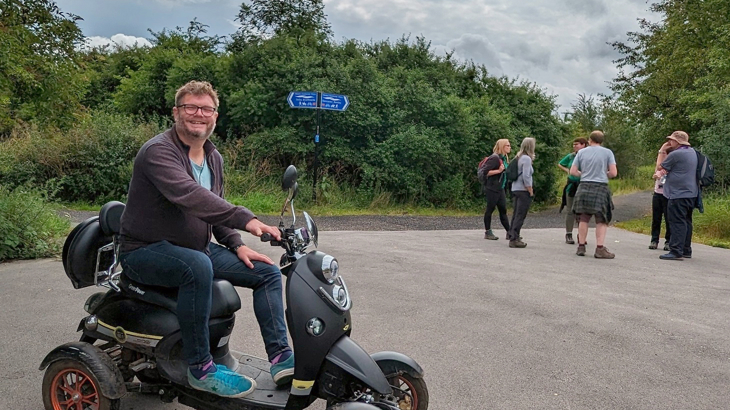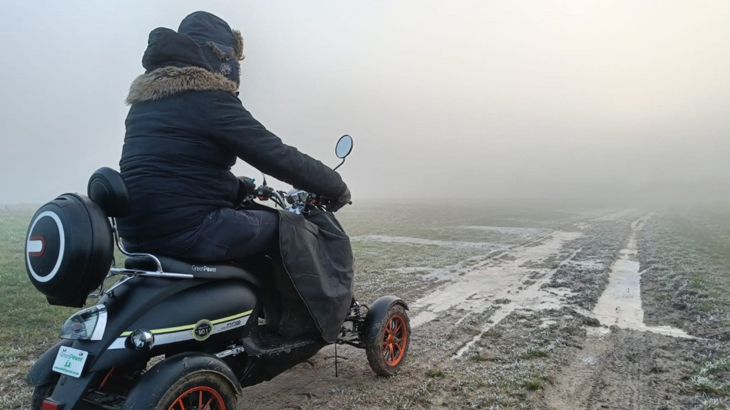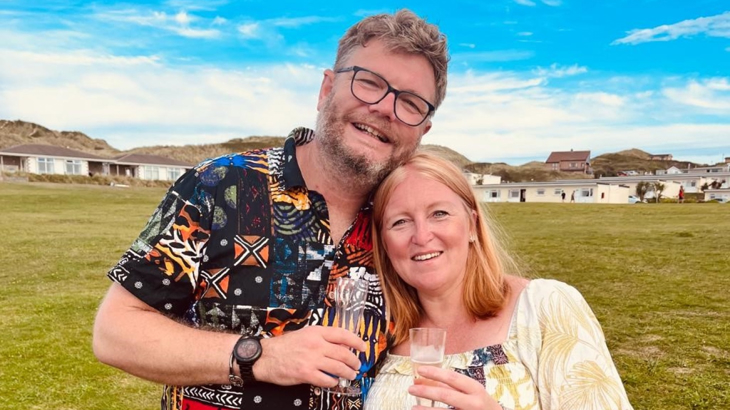When Rob injured his back, his local section of the National Cycle Network became a lifeline for him on his journey to recovery. Being out on the Network on his mobility scooter motivated him on to get walking again.

The Trail has consistently been a healing presence for Rob. Credit: Rob Hughes
The Trans Pennine Trail is one of the UK’s most popular long-distance paths on the National Cycle Network.
At 370 miles-long, it’s a fantastic coast-to-coast challenge, from Southport to Hornsea, and includes several additional spurs.
It's also well-loved as a local green space and traffic-free path by the many communities it passes through.
Path to recovery
The Trail has consistently been a healing presence for Rob who lives in Bentley, Doncaster.
When his friend was struggling with a family bereavement Rob invited him for a walk along the path, just 100 yards from his house.
The track was a peaceful respite from suburban traffic, and gave them both space to think and breathe.
The two friends started going on longer walks to different sections of the trail to the pub.
Later they went to the Lakes and Wales to climb mountains. Rob recalls:
“We were doing 19 mile walks, then we got into cycling too.”
One day they were walking in Wales, during a holiday climbing several mountains in Snowdonia.
Rob stumbled on a rabbit hole, jolting his back and slipping several disks.
The pain was unbearable. A month later he couldn’t walk.
“I went from climbing mountains to not being able to walk.
"I tried cycling for a while but then that became too painful as well.
“I didn’t leave the house for several months.
"I looked at several options for how to get mobile again.
"In the end I chose an off-road mobility scooter, so I could use the Trail.
“I wanted to get something that could handle the bumps. And I wanted to be anonymous.”

"In the end I chose an off-road mobility scooter, so I could use the Trail." Credit: Rob Hughes
Fresh air, independence and social connection
“It was so good to be out on the Trail again. It cleared my head.
“The mobility scooter didn’t do anything for my physical health, but it motivated me to get better and carry on.”
The Trail links communities in towns and cities right along its length.
Much of it is made up of old railway lines, which makes it an effective traffic-free transport connection.
As well as a peaceful haven for wildlife and people.
“My parents live a couple of miles away on the Trail, so it meant I could go and visit them.
"It only took around 10 or 15 minutes on the scooter. It’s nice and quiet and three times quicker than the road.
“The first time I turned up they were a bit shocked. The electric scooter was caked in mud. It was exhilarating to feel independent again.
“I got to know all the dog walkers and people on mobility scooters. I would stop and have a chat with them. It was often the same people day after day.
"It was like having a group of commuter friends.”
Not all access is equal
Soon Rob started meeting up with his walking buddy again and exploring their favourite old routes.
That’s when he started to realise that he wasn’t welcome in some areas of the trail.
“There were a couple of barriers along the trail which made accessibility difficult. It was very frustrating.”
"I’m embarrassed to say it was only when I couldn’t get through it became noticeable to me.
"I hadn’t experienced something like that before, it wasn’t on my radar.
“I get that motorbikes don’t need to be there, but it also stops people with push chairs, prams or wheelchairs.”
New motivation for recovery
By now Rob had a new incentive for recovery.
He had plans to propose to Beccy, his partner of four years (and friend for 12 years).
He wanted to pop the question on the dunes above Hayle Beach, her favourite beach in Cornwall.
That meant being able to cope with the long drive down. And being able to walk again.
He had eight months.
As well as the NHS programme he started a course of osteopathy, physiotherapy and alternative treatments.
He began walking to his office and on the Trail again.
Rob decided to sell the mobility scooter to help buy the engagement ring.
“It’s been a gradual process.
"Initially even short distances were difficult.
"I had to listen to when it’s hurting, hold myself back and not do too much.
“I had to be careful not to undo work I’ve had done.
“The track has been a major part of my health, mental health and wellbeing.
“I’m aiming to walk to the Brewhouse again. And I’m hoping to get back on the bike again.”
One day he noticed that the barrier had been removed and the surface had been improved.
“I was really, really chuffed to see that.
"When I got on there it was incredible. Having that tarmac there makes it a smooth ride now for everyone.
"It’s so nice to see it being well-looked after and accessible for people in wheelchairs, mobility scooters or with buggies and prams.”
By August, Rob was still in pain but he just about fit enough to make the drive.
But the couple nearly had to abandon the trip when his car broke down.
Luckily a friend stepped in, offering to tow their caravan down, and lend them his vehicle.
They drove down to Cornwall and Rob proposed to Beccy on the beach.
“She said yes!
"We had to pinch ourselves. I don’t think either of us knew it could turn out like this.
“I’m excited, proud, and happy as I’ve ever been.”

A happy ending - the pair drove down to Cornwall and Rob proposed to Beccy on the beach. Credit: Rob Hughes






